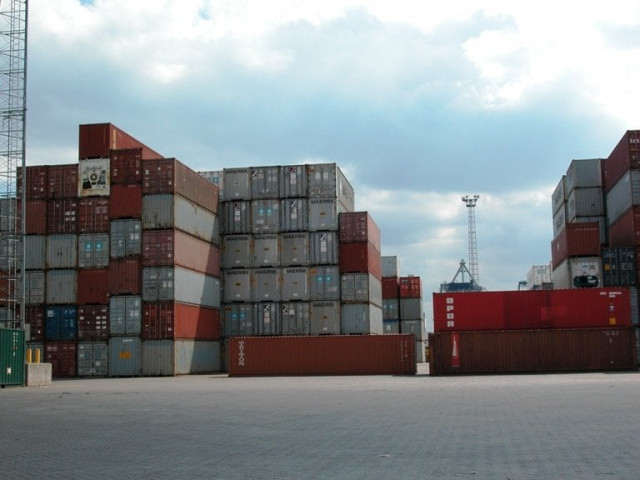Calling for an invisible trade policy
Policy should focus on removing obstacles to creating level playing field.

Pakistan has a widely untapped potential of trade thanks largely to its landlocked western neighbours and market-starved eastern neighbour. PHOTO: FILE
The federal cabinet had approved Rs27.7 billion for implementation of trade policy initiatives under the Strategic Policy Framework 2009-12. During the life of this framework, the Ministry of Commerce received only Rs3 billion, or about 10% of the budget. Thus, lack of fiscal response deprived almost all the 48 trade policy initiatives of cash, which were to be stillborn while exports failed to improve trade balance.
While the Ministry of Commerce did not receive 90% of its Rs27 billion, in the same time period of 2009-12, the finance ministry spent Rs27 billion on fertiliser subsidies, Rs45 billion in cash transfer to poor families under the Benazir Income Support Programme and Rs900 billion on state-owned enterprises.
For every rupee meant to be spent on trade enhancement, the finance ministry spent Rs35 on doling out welfare. The federal government cared so much about the poor, that it forgot the trade. It also forgot a basic lesson – it is trade which is engine of prosperity. Trade was never a priority for a pro-poor government.
Despite the dried funding pipeline, the Trade Policy 2009-12 gained ground on a number of fronts using Export and Import Policy Orders, such as permitting export of edible oil in bulk and allowing import of donated ambulances of certifiable standards.

In some fringe areas, the trade policy played a positive role in enhancing exports such as those of motorcycles, which grew to $3.5 million in 2010-11 from $786,310 in 2009-10. Other examples of success were setting up of effluent treatment plants in the leather industry following the policy incentives. It also provided ad hoc relief through cash support reducing the effective cost of inland freight.
As these successes show, the trade policy did not play any significant role in trade enhancement. A fundamental reason can be its poor funding base, however, a well-funded trade policy had its own failures.
For the trade policies preceding 2009, the flagship project was R&D subsidy for the textile sector, with the price tag of Rs50 billion. A major policy lesson which the trade policy has learnt over the years is that cash support schemes like R&D subsidies for textile have not worked in the long run. First, they failed to kick-start any innovation in the recipient firms. Second, they actually resulted in price transfer, thus benefitting our much wealthier international customers.
The lesson is that the absence of comparative advantage cannot be adequately compensated by any cash assistance. While these subsidies were introduced as shock absorber in 2005 in the post-MFA regime, in the hindsight, they proved to be artificial oxygen supply for a dying patient. Energy crisis in the subsequent years was the last nail in his coffin.
If the success of trade policy is then, not a question of resources, what the trade policymakers should do? Shortest answer is: nothing. A more serious answer is: trade policy should be negative in character instead of positive ie it should focus on ensuring removal of obstacles and anomalies in creation of level playing field instead of hand-holding of favourites and distribution of candies. Probably, the best trade policy will be an invisible trade policy.

Pakistan has a widely untapped potential of trade thanks largely to its landlocked western neighbours and market-starved eastern neighbour. Policymakers need to understand that this trade potential cannot be transformed into wealth by just policy coordination, sector incentives, cash transfers, subsidies and ad hoc reliefs in absence of a competitive supply chain.
Trade is too complex to be ‘managed’ and it is largely navigated by an invisible hand. Even in the ideal case scenario of a fully funded trade policy, poorly organised enterprises could not have sustained. Indeed, artificially induced supports only disrupt capital allocation as well as entrepreneurial talent, which is the key to growth.
It is true that the policy frameworks for 2009-12 and now 2012-15 showed several examples of business-friendly reforms. However, the entire language of both frameworks remains shrouded in the familiar “all-knowing”, “wise” benevolence of the state which has been unfortunately captured by the elite. Democracy is about to give people another chance to change this language. Competing political parties and the upcoming federal government should also be given a chance to define this new language.
The writer is founder of PRIME, a free market economy think tank based in Islamabad
Published in The Express Tribune, February 25th, 2013.
Like Business on Facebook to stay informed and join in the conversation.


















COMMENTS
Comments are moderated and generally will be posted if they are on-topic and not abusive.
For more information, please see our Comments FAQ